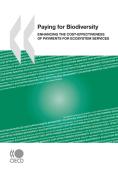
Biodiversity and ecosystem services provide tangible benefits for society, such as food provisioning, water purification, genetic resources or climate regulation. These services provide critical life support functions and contribute to human health, well being and economic growth. Yet biodiversity is declining worldwide and, in some areas, this loss is accelerating. The need for policies that promote the conservation and sustainable use of biodiversity and ecosystem services is more important than ever.
Payments for Ecosystem Services (PES) is a direct and flexible incentive-based mechanism under which the user or beneficiary of an ecosystem service makes a direct payment to an individual or community whose land use decisions have an impact on the ecosystem service provision. Interest in PES has been increasing rapidly over the past decade: PES are proliferating worldwide and there are already more than 300 programmes in place today at national, regional and local levels.
Sustainable Materials Management (SMM) is increasingly recognised as a policy approach that can make a key contribution to green growth and the challenges that are posed by sustained global economic and demographic growth. One of the key challenges of the SMM approach is to effectively address the environmental impacts that can occur along the life-cycle of materials, which frequently extends across borders and involves a multitude of different economic actors.
This book outlines a series of policy principles for SMM, examines how to set and use targets for SMM, and explores various policy instruments for SMM. In addition it provides examples of policy action plans from the UK and the Netherlands, before presenting a series of conclusions and recommendations.
In the context of the economies of the world becoming greener, this book provides a global and interdisciplinary overview of the condition of the world’s water resources and the infrastructure used to manage it. It focuses on current social and economic costs of water provision, needs and opportunities for investment and for improving its management. The book describes the large array of water policy challenges facing the world, including the Millennium Development Goals for clean water and sanitation, and shows how these might be met. There is a mixture of global overviews, reviews of specific issues and an array of case studies. It is shown how accelerated investment in water-dependent ecosystems, in water infrastructure and in water management can be expected to expedite the transition to a green economy. The book provides a key source of information for people interested in understanding emerging water issues and approaches that are consistent with a world that takes greater responsibility for the environment.
This report focuses on the results of a public-private dialogue in the Greater Mekong Subregion (GMS). The report outlines the key findings and recommendations from the event held in Bangkok, Thailand, in June 2013, and provides insights into the key opportunities emerging from the transition to a green economy in the region. Initiated by the OSLO Consortium, the public-private dialogue was co-organised by the Global Mechanism, the Asian Development Bank, UNEP, UNDP, FAO and WWF.
India’s sustained and rapid economic growth offers an opportunity to lift millions out of poverty. But this may come at a steep cost to the nation’s environment and natural resources. Greening India's Growth: Costs, valuations and trade-offs analyzes India’s growth from an economic perspective and assesses whether India can grow in a “green” and sustainable manner.
